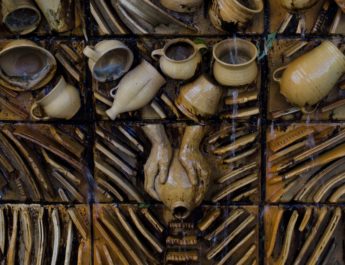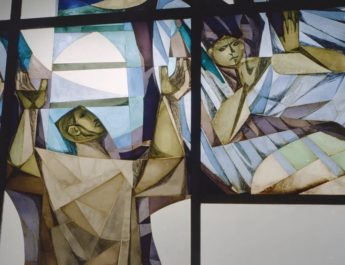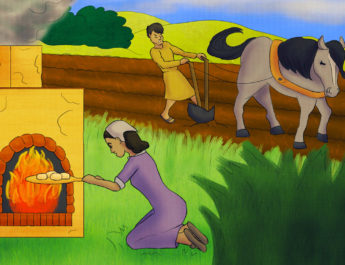Psalm 128
A “Song” = shir. From shir (to sing; one who is singing or leading others in song). This is song or singer.
B “Ascents” = ma’alah. From ma’aleh (ascent, platform, slope, stairs, cliff, elevation, a rise; figuratively, a priority); from alah (to go up, ascend, be high, be a priority; to arise in a literal or figurative sense). This is something that arises, elevation, a journey to a higher pane. This can be used figuratively to mean having a though or being of a superior status. It is often used in a specific sense for something the mounts to a climax. This is step, stair, or high degree.
1 HappyC is everyoneD who fearsE the Lord,F
C “happy” = esher. From ashar (to go straight, lead, guide; to be level and so to be right, blessed, honest, happy). This is happy or blessedness.
D “everyone” = kol. From kalal (to complete). This is all or every.
E “fears” = yare. From the same as yare (to fear, be afraid, dreadful; also fearful reverence – to fear in a moral sense is to say to revere, respect). This is fearful or morally reverent.
F “Lord” = YHVH. From havah (to be, become) or hayah (to come to pass, become, be). This is the name of the God of Israel, the self-existent and eternal one, the tetragrammaton. This pronunciation has been lost to time so “Lord” is generally used in its place.
who walksG in his ways.H
2 You shall eatI the fruit of the laborJ of your hands;K
you shall be happy, and it shall go wellL with you.
G “walks” = halak. This is go, come, walk. It is walk literally and figuratively and includes people and animals. It can be used figuratively for one’s moral life – how we walk according to God’s way or against it. It can also refer to the walk of life as in the course one’s life takes, the choices we make, etc.
H “ways” = derek. From darak (to tread, march, to walk. Can also mean affixing a string to a box since one needs to step on it to bend it in the process; so also an archer). This is a road as a thing that is walked on. Can be used figuratively for the path that one’s life takes or how one chooses to live one’s life.
I “eat” = akal. This is to eat, devour, burn up, or otherwise consume. It can be eating in a literal or figurative sense.
J “labor” = yegia. 16x in OT. From yaga (to work, become weary, to gasp or be exhausted). This is that which comes from labor – product, possession, fruit, toil, wages, etc.
K “hands” = kaph. From kaphaph (to bend – from a root meaning curve or bend down). This is palm of the hand or sole of the foot, footstep, grasp. Figuratively, it can also mean power.
L “well” = tob. From tob (to be pleasing, to be good). This is good, beautiful, pleasant, agreeable, bountiful, at ease. This word is used for goodness as a concept, a good thing, a good person. This can refer to prosperity and welfare as well as joy, kindness, sweetness, and graciousness. So, this is ethically good, but also enjoyably good.
3 Your wifeM will be like a fruitfulN vineO
withinP your house;Q
M “wife” = ishshah. From ish (man); perhaps from enosh (human, humankind, mortal); from anash (to be weak, sick, or frail). This is woman, wife, or female.
N “fruitful” = parah. This is to bear fruit, grow, be fruitful, increase. It is bearing fruit in a literal or figurative sense.
O “vine” = gephen. Root may mean to twine or bend. So, it is a vine, particularly referring to grapes.
P “within” = yerekah. From yarek (thigh, side, body, shank; can be figurative for genitalia). This is flank, side, recesses, border, quarter, extreme parts.
Q “house” = bayit. Probably from banah (to build, make, set up, obtain children; to build literally or figuratively). This is house, court, family, palace, temple.
your childrenR will be like oliveS shootsT
aroundU your table.V
R “children” = ben. Related to “house” in v3. From banah (see note Q above). This is son, age, child. It is son in a literal or figurative sense.
S “olive” = zayith. This is olive tree, grove, or other parts of the olive tree like the branch or berry.
T “shoots” = shethil. 1x in OT. This is a sprig or sucker – a plant that is transplanted.
U “around” = sabib. From sabab (turning around, going around; to surround, cast, walk, fetch; to revolve or border in a literal or figurative sense). This is a circuit or a circle. It could refer to an environment, one’s neighbors, or a circular path round about.
V “table” = shulchan. Perhaps from shalach (to send, send for, forsake). This is a table or meal.
4 WThusX shall the manY be blessedZ
who fears the Lord.AA
W {untranslated} = hinneh. From hen (lo! Behold! If, though; an expression of surprise). This is to draw attention, show suddenness or surprise, or to emphasize the importance of the coming statement. See! Lo! Behold!
X “thus” = ken. Perhaps from kun (properly, in a perpendicular position; literally, to establish, fix, fasten, prepare; figuratively, it is certainty, to be firm, faithfulness, render sure or prosperous). This is to set upright. Generally used figuratively to mean thus, so, afterwards, rightly so.
Y “man” = geber. From gabar (to be strong or mighty; to prevail or to be insolent) This is man, warrior, a person generally, or a valiant person.
Z “be blessed” = barak. This is to kneel, to bless. It is blessing God as part of worship and adoration or blessing humans to help them. It can be used as a euphemism to say curse God.
AA “Lord” = YHVH. Related to “Lord” in v1. This has a different vowel pointing, but the same meaning. See note F above.
5 The LordBB bless you from Zion.CC
May you seeDD the prosperityEE of JerusalemFF
BB “Lord” = YHVH. Same as “Lord” in v4. See note AA above.
CC “Zion” = Tsiyyon. Related to tsyiyyun (signpost, monument); from tsavah (to charge someone, to command, order); from the same as tsiyyah (dryness drought); from a root meaning parched as desert, dry land. Zion can refer to a mountain in Jerusalem as well as another name for Jerusalem itself or the people.
DD “see” = raah. This is to see in a literal or figurative sense so stare, advise, think, view.
EE “prosperity” = tub. Related to “well” in v2. From tob (see note L above). This is goodness, gladness, something that is good. It can also be beauty, welfare, or joy.
FF “Jerusalem” = Yerushalaim. From yarah (to throw, shoot, be stunned; to flow as water so figuratively to instruct or teach) + shalam (to make amends, to be complete or sound). This is Jerusalem, dwelling of peace.
allGG the daysHH of your life.II
6 May you see your children’s children.
PeaceJJ be upon Israel!KK
GG “all” = kol. Same as “everyone” in v1. See note D above.
HH “days” = yom. Root may mean being hot. This is the day in a literal or figurative sense. It can also mean birth, age, daylight, continually or other references to time.
II “life” = chay. From chayah (to live or keep alive literally or figuratively). This is alive, living, lifetime. It can also be used to describe someone’s age. It can refer to animals, plants, water, or a company or congregation of people. It is life in a very broad sense.
JJ “peace” = shalom. Related to “Jerusalem” in v5. From shalam (see note FF above). This is completeness, soundness, welfare, favor, friend, good health. It is to be safe and figuratively well, happy, at peace, friendly. Abstractly, it includes the ideas of welfare and prosperity (not in excessive wealth, but in having enough).
KK “Israel” = Yisrael. From sarah (to persist, exert oneself, contend, persevere, wrestle, prevail) + el (God or god). This is Israel, meaning God strives or one who strives with God; new name for Jacob and for his offspring. This refers to the people and to the land.
Image credit: “Walking in the Mist” by Matthew Kirkland, 2005.




